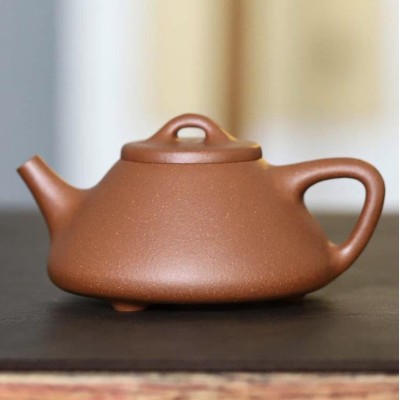







"Shipiao" Yixing teapot- this zisha teapot is a traditional Chinese tea set characterized by its gourd-like or calabash-like shape, with a small top and large bottom, a sturdy and short spout, and a pyramid-shaped body that exudes elegance. Made from high-quality purple clay material, this teapot is known for its hardness and durability, as well as its stable and easy-to-use design. The short and powerful straight spout ensures a smooth and steady flow of water, while the pyramid-shaped body adds a touch of sophistication to any tea ceremony.
 Delivery
Delivery
Free shipping within 1 to 3 days. ETA:5-7 days
 Returns
Returns
Within 28 days after delivery date.
 Security
Security
SSL | GDRP used to ensure information security.
Guarantee safe & secure checkout
Data sheet
This yixing teapot has exceeded my expectations. The clay material is exceptional at keeping the tea warm, and the pour is smooth and precise. The unique design and functionality make it a standout teapot in my collection. I highly recommend it to anyone looking for a special and high-quality teapot.
I received this yixing teapot as a gift and it has quickly become a cherished item in my collection. The elegant design and the smooth pour make it a joy to use. The clay material gives it a classic feel, and it's now the centerpiece of my tea set. I highly recommend it to anyone who appreciates fine teaware.
The "Banyue" Yixing teapot has always held a special place for its simplicity, elegance, and gracefulness. The "Banyue" Yixing teapot is harmonious, spacious, and concise, with a balance between outward expression and inward restraint. It is like a beautiful piece of writing that becomes more intoxicating with each read. The teapot creates a sense of longing for reunion, as expressed in the Chinese saying, "the bright moon sends thoughts a thousand miles, while the half moon intensifies them even more." The teapot not only speaks of longing but also expresses the traditional Chinese cultural yearning for "full moon, full people." Therefore, the "Banyue" Yixing teapot is a true embodiment of Chinese culture.
The design of the "Xubian" zisha teapot is a combination of the elements of the "Xubian" and the "Gongdeng". "Xubian" refers to the flat shape of the body of the pot, while "Gongdeng" refers to the shape of the lid of the pot, which is like a palace lamp. This design not only retains the characteristics of traditional purple clay pots, but also adds some new elements, making the "Biandeng" more ornamental and collectible.
Pear-shaped yixing teapot,it is one of the pot styles that originated in the Chian Yuan Dynasty and became popular during the China Ming Dynasty. It is named after its pear-like shape.
"Jizhi" yixing teapot has a straight cylindrical body with a shoulder, short neck, and straight spout. The handle is free-flowing and ear-shaped, while the lid fits tightly. The bottom of the pot is neatly crafted with exquisite workmanship. The overall design of the pot displays a strong contrast between thick and thin lines, as well as between straight and curved lines, giving it a deep, simple, and powerful temperament. At the same time, it also exudes a sense of elegance and grace. It seems that the "Jizhi" teapot conveys a spirit of honesty and justice, daring to advise others.
"Hanwa" Yixing teapot is shaped like a cylindrical jar, which appears straight up and down, but has an arched middle that gives it a strong tension. The lid is a large, slightly bulging and curved circle, with a bridge-shaped knob on top that slopes gently. The straight spout is of moderate length, while the ear-shaped handle is slightly flattened in the middle. Both the spout and handle are polygonal, providing visual changes and a classic combination of square and round in art.
"Hehuan" means "all happy",the zisha art master- "Mansheng" was inspired by the beautiful and harmonious sound of the cymbals coming together during the celebration. He believed that this sound brought joy and happiness to people, so he used the shape of the cymbals as a model to design the Hehuan teapot. He named it after the joyous sound they made when struck together, and the teapot's unique shape and design symbolize the harmony and beauty of life.
"De" means morality,"zhong" means "bell",The bell-shaped lid and body of this zisha teapot symbolize a person with noble character, frugality, and simplicity. Owning this teapot is seen as a sign of being a true gentleman, as it represents the values of humility and refinement.
"Bafang"-The octagonal yixing teapot is a relatively rare type of square-shaped purple clay teapot. The lines and surfaces are straight, flat, and distinct, giving people a sense of cleanliness, sharpness, and elegance. The rules for creating a square-shaped teapot require "smooth lines, distinct contours, and a stable and solemn appearance," with straight and horizontal lines as the main elements, and curved and thin lines as the auxiliary elements. In addition to requiring symmetry between the mouth, lid, spout, handle, and body of the teapot, the square shape also requires "roundness within squareness, seeking change within the squareness, and uniformity between the mouth and lid, with a balance between rigidity and flexibility."
"Xishi" yixing teapot is the quintessential model and the most popular style of Yixing clay teapot. It boasts a round and plump body, a cut lid, a short spout, and an inverted handle. The pot's body resembles the full breast of a young woman, while the knob on the lid is shaped like a nipple. The bottom of the pot curves inward naturally, and the handle is fashioned like an upside-down ear, reminiscent of the hairstyle of ancient Chinese women. When pouring tea, the handle resembles the slender waist of a beautiful woman. The Xishi teapot is renowned for its unique ability to brew tea, allowing the tea leaves to fully expand and release a more intense aroma and flavor.
"Julun" yixing teapot- this "Julun" zisha teapot is designed for practicality, with a spout that ensures smooth water flow and a handle that is easy to grip. The lid is also uniquely designed for easy removal. Despite its distinctive and eye-catching appearance, the "Julun" teapot is a functional and practical utensil that is highly valued by tea enthusiasts for its ability to brew tea effectively and efficiently. Its unique shape allows tea leaves to fully expand, releasing more aroma and flavor. The name "JuLun" comes from its shape, which resembles an upside-down cartwheel. This teapot is not only aesthetically pleasing but also highly functional, making it a popular choice among tea lovers and collectors.
The Melon-shaped Yixing teapot is a classic example of the zisha teapot. It is characterized by its unique shape, which resembles some melon , and is made of purple clay, also known as zisha clay.
"Shipiao" Yixing teapot- this zisha teapot is a traditional Chinese tea set characterized by its gourd-like or calabash-like shape, with a small top and large bottom, a sturdy and short spout, and a pyramid-shaped body that exudes elegance. Made from high-quality purple clay material, this teapot is known for its hardness and durability, as well as its stable and easy-to-use design. The short and powerful straight spout ensures a smooth and steady flow of water, while the pyramid-shaped body adds a touch of sophistication to any tea ceremony.
"De" means morality,"zhong" means "bell",The bell-shaped lid and body of this zisha teapot symbolize a person with noble character, frugality, and simplicity. Owning this teapot is seen as a sign of being a true gentleman, as it represents the values of humility and refinement.
"De" means morality,"zhong" means "bell",The bell-shaped lid and body of this zisha teapot symbolize a person with noble character, frugality, and simplicity. Owning this teapot is seen as a sign of being a true gentleman, as it represents the values of humility and refinement.
"Duoqiu" yixing teapot is a classic example of a geometric-style traditional round teapot and one of the finest representatives of purple clay teapots. Its basic form consists of a pot knob, pot cover, and pot body, composed of small, medium, and large spheres arranged in sequence. The pot belly is a large sphere, and the pot cover is a small sphere, giving the appearance of a small ball placed on top of a large ball, hence the name "duoqiu" teapot. This unique design creates a visually striking and aesthetically pleasing teapot that is highly prized by collectors and tea enthusiasts alike.
"Fanggu" Yixing Teapot - This zisha teapot has an antique cylindrical body shaped like a drum, with a short neck imitating the shape of a drum pot. The spout is also designed to imitate the shape of a drum pot spout, with a straight line. Its advantages include excellent heat preservation, natural color, comfortable texture, and long service life. The "Fanggu" teapot is a unique and elegant choice for tea lovers and collectors alike.
NOTICE : Cookies ensure the smooth running of our services and improve user experience,Using these, you accept the use of cookies. Learn More.